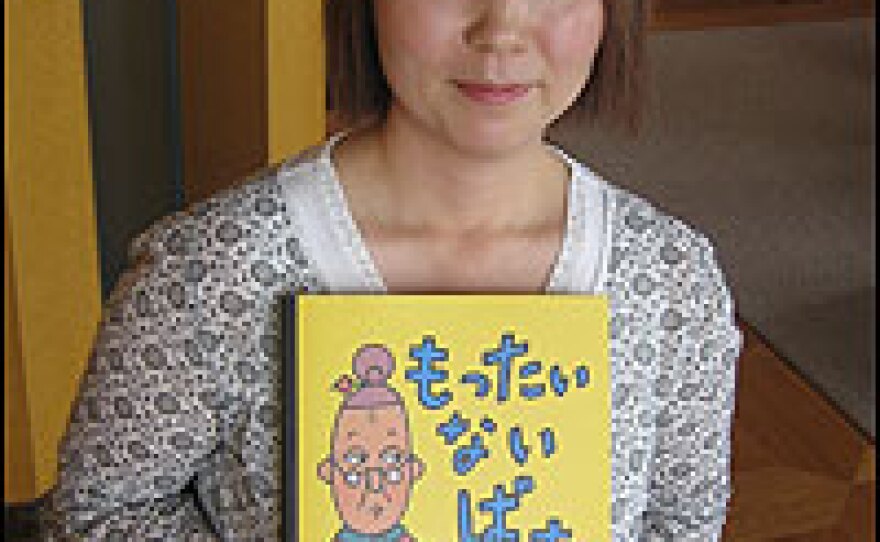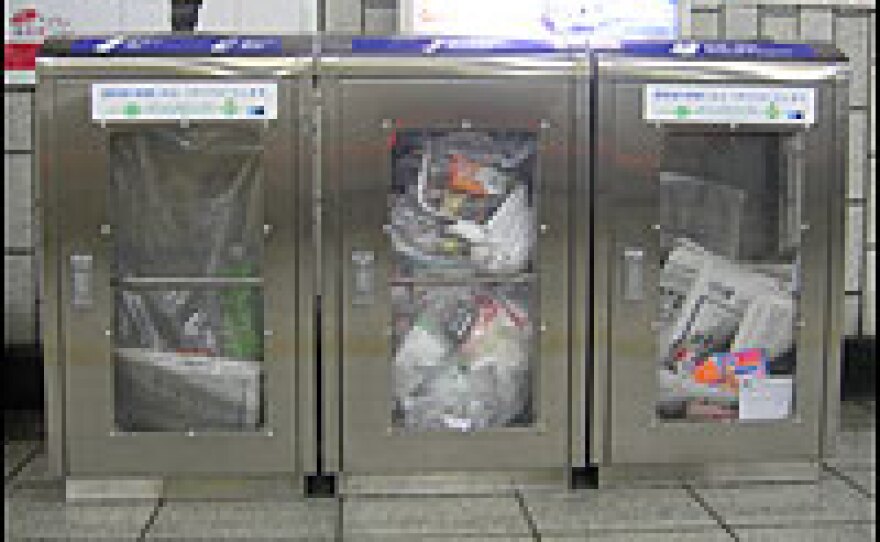

One way to reduce greenhouse gas emissions is through conservation — living small and smart.
Japan has a strong tradition of conservation, but it's also a country that likes the good life. And the good life requires electricity and lots of it.
Although a single hotel room in Japan can have four remote controls, a talking bath and heated toilet seats, a new popular children's book called Mottainai Grandma sends a different message about energy conservation.
Mottainai Grandma Is Coming!
The book begins: "Mottainai Grandma is coming!" which depending on your viewpoint is either cause for celebration or reason to run.
Mottainai roughly translates as "Don't waste." In the drawings, Grandma looks a little stern with her hair up in a bun and cane in hand. And there's no avoiding her eyes.
"Mottainai!" she says to her grandson, who is brushing his teeth. "One cup of water is enough!"
For many Japanese, the book is very funny — a scene right out of childhood.
"Grandma clearly loves the boy," says Yuko Kawanishi, a sociologist at Tokyo Gakugei University. But according to Kawanishi, Mottainai Grandma also has a compulsive need to wring every bit of usefulness from an object. Crumpled paper? Make a dinosaur. Leftover pencil stubs? Draw a rainbow!
"I don't think my grandmother was this harsh," Kawanishi says. "But she used to think the same way."
On one page of the book, the grandson has some rice left on his face from eating. Grandma says, "Let me lick it off!"
Her grandson squirms: "Yuk!" But Grandma keeps saying "Mottainai, let me lick more. Lick lick!" Kawanishi laughs at the scene.
A Childhood Notion
Mottainai is not some ancient Japanese notion that was lost thousands of years ago. People say the "finish your rice" lesson had been drilled into them from childhood.
Junko Takahashi, an interpreter, said that she was told as a child that she would go blind if she didn't eat every grain of rice. She still remembers one evening, at age 4 or 5, when she could not finish her rice. Her little stomach was just full.
"So I started crying, crying, and I said, 'Father I cannot eat all of them,'" Takahashi recalls. "My father said, 'No, you have to eat them all. Otherwise you cannot go to bed.'"
She said her entire family finished their meals and went to bed. Her father was asleep and Takahashi started crying over the rice.
"I went to my father and I said, 'Father, I still cannot eat the rice,'" she says. "He said, 'I don't know, you have to finish them.'"
Since then, Takahashi says, she has to finish her rice.
"Over 30 years and still I cannot leave the rice," she says. "It's kind of traumatic!"
Westernizing Mottainai
Mottainai is an old Buddhist word. Kawanishi says it also ties in with the Shinto idea that objects have souls.
"The whole idea that we are part of the nature, and should be in a very harmonious relationship with nature is very much a deep part of Japanese psychology," Kawanishi says.
But mottainai also stems from some tough realities. Japan has little in the way of natural resources, so it traditionally has had to import. And until recently, Japan was relatively poor.
But not anymore. Tokyo can be overwhelming, even if you're from New York. Some streets are so brightly lit that it's hard to tell the outside from the inside and day from night. And Japan's carbon emissions are up since 1990, even though it has pledged to reduce them and the population is flat and expected to drop.
Throughout the country, there are more apartment buildings, more offices, appliances and electronics.
The Hummer's Call
But the idea of mottainai is still active in the cultural DNA somewhere. It's not uncommon for people to reuse water from the evening bath in their laundry machines.
And in Japan, a trash can is not just a trash can — it's three or more joined together for recycling. One for bottles, one for cans, etc.
There seem to be two ideas sitting uncomfortably in the same brain. One: I should not waste. And two: I want what the modern world has to offer.
Like a Hummer.
Fujimura Ikuzo is a 33-year-old hipster designer. He says he'd like to own a Hummer, but it won't fit in his parking space.
Hybrid cars sell well in Japan, but he says they're not for him.
"Yeah it's nice," Ikuzo says. "They run a lot of distance for little gasoline. It's boring."
But Ikuzo is aware of climate change. He says it is cool to be environmentally conscious in Japan and he reuses his bath water to wash out his paint brushes.
"You know, small things I can do to try to make up," he says. "I use a lot of gasoline. It's balance."
And this really is one of the central dilemmas the world faces with climate change. How much should everyone sacrifice? Do we need to sacrifice?
It's hard to take the pulse of a country, but those Mottainai Grandma books seem to have struck a chord. They're selling well — more than 400,000 copies.
A Modest Reminder
Mariko Shinju, author and illustrator of Mottainai Grandma, wrote the book because her 4-year-old son didn't understand why it was so important to finish his food.
Shinju says that the concept of mottainai has been forgotten.
"Our parents told us what mottainai is so we know what it means," she says. "But if we don't teach them to our children, they don't learn. It's a very scary thing. That's why I thought we have to make an effort to teach the idea and to change the situation."
Magazines and newspapers are now asking Shinju to draw and write Mottainai Grandma stories for them. There's also a compact disc of children's songs about the concept of mottainai.
This pushy, dancing grandma is not the only one re-educating the Japanese about mottainai.
There's also Wangari Maathai, winner of the Nobel Peace Prize. She's not Japanese, but rather, from Kenya, Africa. But she has become a kind of a celebrity in Japan, teaching the Japanese about their own word.
Kawanishi says this sort of thing happens all the time. Japan discards an idea as it Westernizes and it takes someone from the outside to say "You know, you had something interesting there."
Copyright 2022 NPR. To see more, visit https://www.npr.org. 9(MDAzMjM2NDYzMDEyMzc1Njk5NjAxNzY3OQ001))







